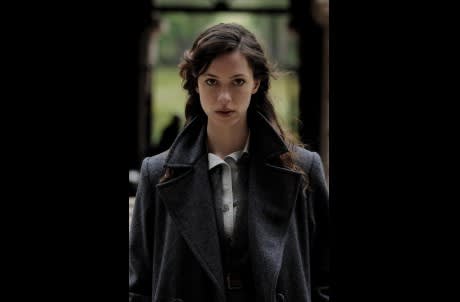During the brief interview snippets included as the sole Blu-Ray supplement, actress Rebecca Hall and director Nick Murphy discuss the vast implications of WWI on society and culture. Noting that millions were killed by war and influenza during the early part of the 20th Century, the overriding tendency towards superstition and less tangible belief systems helped provide some sort of emotional security, suggesting that our ephemeral nature is only a part of our spiritual journey. What they don't discuss in as much detail is the effect that war had on gender roles, which is in essence a large component to the thematic make-up of highly intelligent, low key ghost story The Awakening. Florence Cathcart (Hall) is an educated woman and published writer, widely respected for her mental acuity. Being 1921 London, this character portrait — beyond her counter-intuitive, unequivocal assertion of scientific principle — marks a turn in gender presentation and performance, when women had to tackle traditionally male roles while the men were off fighting in the war. Herself a widow, this rigid assertion of tangibility as the chief component of reality is a peculiarity, shutting down the emotional possibility of self-delusion in reuniting in the afterlife. This guiding belief is ultimately how she presents herself to the world, working as a leading paranormal debunker, disproving any assertion of supernatural existence she comes across. Of course, it wouldn't be a narrative film without some sort of character arc, which is why her trip to a boys' school, where there are reports, and photographic evidence, of a spiritual presence, proves problematic and ideologically challenging. And while it eventually forces her to confront her psychological make-up and rationale for defining her world with such cool certainty, it's the jump scares and slow building suspense during her investigation that give The Awakening a necessary visceral component. Shot with a blue-grey hue and exquisitely realized composition, Nick Murphy's treatise on the nature of grief and delusion as a mode of self-preservation is almost pornographic in its visual splendour. Beyond this, the very subtle way in which the characters are composed, injecting worldviews into conversation without turning the film into plodding didactics, is quite remarkable. Florence befriends Robert Malloy (Dominic West), the teacher that convinced her to investigate the ghostly claims, with an unspoken understanding. She watches him reopen his old wounds and dwell in the past, just as he quietly watches her repress and ignore hers. It's this duality that makes the eventual emotional examination of self that much more telling and profound, leaving the audience with far more insight into the nature of superstition than the occasional jump scares and spooky set-up might suggest.
(eOne)The Awakening [Blu-Ray]
Nick Murphy

BY Robert BellPublished Feb 7, 2013



